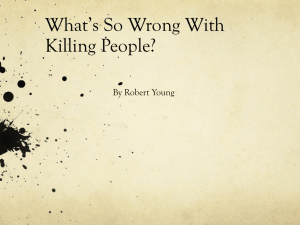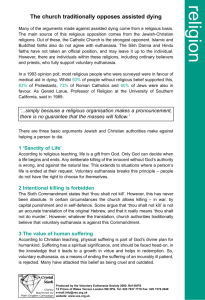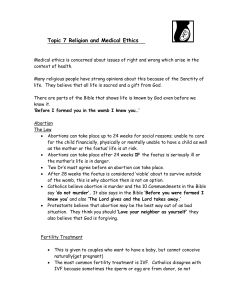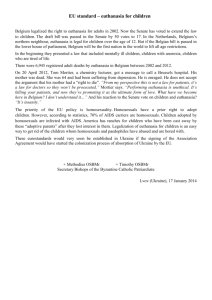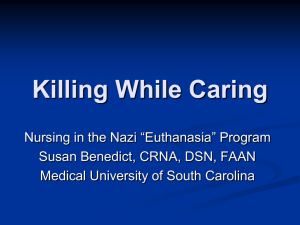Euthanasia and Assisted Suicide - Solas Centre for Public Christianity
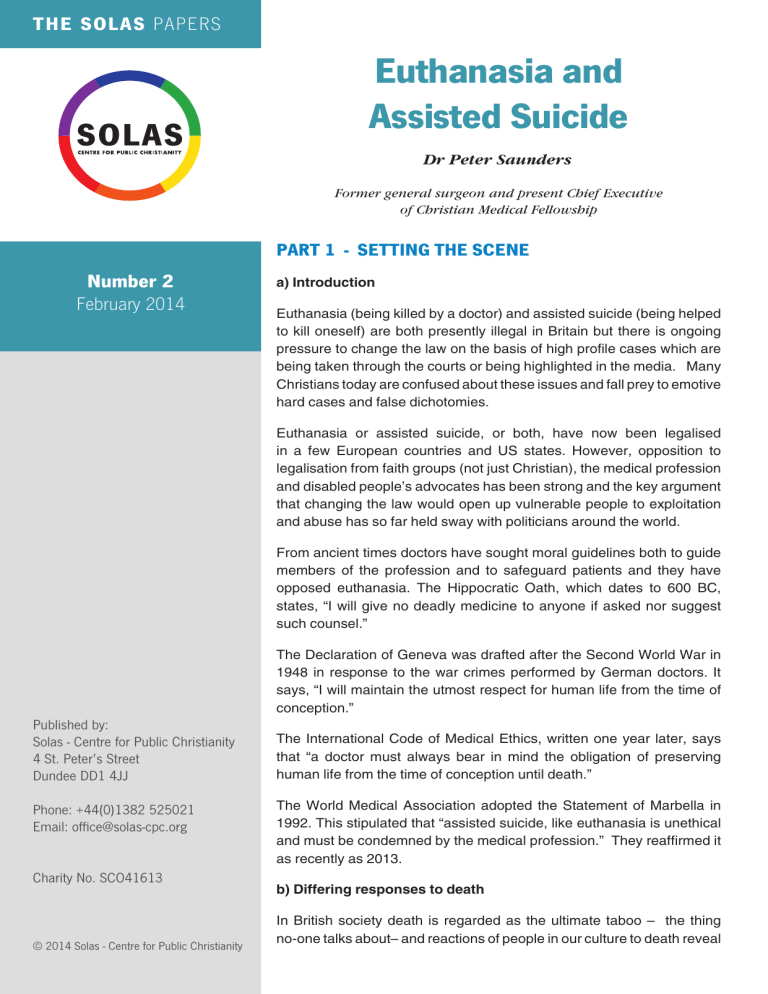
THE SOLAS PAPERS
Number 2
February 2014
Published by:
Solas - Centre for Public Christianity
4 St. Peter’s Street
Dundee DD1 4JJ
Phone: +44(0)1382 525021
Email: office@solas-cpc.org
Charity No. SCO41613
© 2014 Solas - Centre for Public Christianity
Euthanasia and
Assisted Suicide
Dr Peter Saunders
Former general surgeon and present Chief Executive of Christian Medical Fellowship
PART 1 - SETTING THE SCENE
a) Introduction
Euthanasia (being killed by a doctor) and assisted suicide (being helped to kill oneself) are both presently illegal in Britain but there is ongoing pressure to change the law on the basis of high profile cases which are being taken through the courts or being highlighted in the media. Many
Christians today are confused about these issues and fall prey to emotive hard cases and false dichotomies.
Euthanasia or assisted suicide, or both, have now been legalised in a few European countries and US states. However, opposition to legalisation from faith groups (not just Christian), the medical profession and disabled people’s advocates has been strong and the key argument that changing the law would open up vulnerable people to exploitation and abuse has so far held sway with politicians around the world.
From ancient times doctors have sought moral guidelines both to guide members of the profession and to safeguard patients and they have opposed euthanasia. The Hippocratic Oath, which dates to 600 BC, states, “I will give no deadly medicine to anyone if asked nor suggest such counsel.”
The Declaration of Geneva was drafted after the Second World War in
1948 in response to the war crimes performed by German doctors. It says, “I will maintain the utmost respect for human life from the time of conception.”
The International Code of Medical Ethics, written one year later, says that “a doctor must always bear in mind the obligation of preserving human life from the time of conception until death.”
The World Medical Association adopted the Statement of Marbella in
1992. This stipulated that “assisted suicide, like euthanasia is unethical and must be condemned by the medical profession.” They reaffirmed it as recently as 2013. b) Differing responses to death
In British society death is regarded as the ultimate taboo – the thing no-one talks about– and reactions of people in our culture to death reveal
The Solas Papers Number 2 - February 2014 our deep insecurities. We fear death because it is something that is out of our control. As Woody Allen quipped, “I’m not afraid of dying. I just don’t want to be there when it happens.” assisted suicide. c) Questions about life after death
The world’s religions treat death in different ways.
In cultures which believe in an afterlife the fear of what might happen after death is understandably very real.
But in cultures like our own, increasingly dominated by atheism, the fear of the dying process has become the main focus.
Christianity, Islam and Judaism teach that death is not the end; it is a pathway to judgment where our ultimate destination depends on choices and decisions made in this life.
There are several reactions seen in terminally ill patients facing death:
Hinduism, and to some extent Buddhism, teach that death is a pathway to a cycle of death and rebirth, with our reincarnated status in the next life depending on “karma” accumulated in this one.
• some decide to fight the illness in order to prevent death happening by seeking any treatment that is on offer, including those for which there is no evidence that they actually work
Polytheistic religions like those of ancient Rome and
Greece, and in some developing countries today, teach that death is an entry point to the spirit world.
• others try to exert control over death by asking for the euthanasia needle or a draught of sleeping tablets
• some simply deny that death is going to happen and begin to live in a fantasy world, avoiding any discussion of the issue
In stark contrast, the prevailing view now in Western culture is that death is the end of existence. “I believe that when I die I shall rot, and nothing of my ego will survive”, declared philosopher Bertrand Russell.
• others despair, give up and become depressed.
Depression is very common in dying patients and often needs treatment in addition to their medical condition
The one thing that everybody must agree about these varied views is that no two of them can be equally right, because they make mutually contradictory truth claims. Either death is the end or it’s not. If it’s not then reincarnation and judgment leading to heaven or hell cannot be equally true. It’s one or the other or something else altogether.
• others accept the diagnosis and outlook and seek palliative treatment that will control their symptoms and make dying as comfortable as possible d) Recent history
Doctors also, being equally human, react to death and dying in a variety of ways. Some doctors (particularly in days past) may choose to deny to the patient that death is going to happen by telling them subtle lies about the diagnosis or prognosis or by using jargon that the patient may not understand. Others may simply despair of the patient and look for someone they can spend their time on more effectively. The dying patient becomes someone to avoid because he or she speaks to them of their failure to offer a cure.
Some may fight death in their patients, continuing to use therapeutic interventions of ever diminishing value (for example chemotherapy for some hopelessly advanced tumours) when all hope of a cure has passed and symptom control will be limited. Others may be tempted to control death with euthanasia or
Consider the following words of a doctor who was on trial for carrying out euthanasia.
My underlying motive was the desire to help individuals who could not help themselves... such considerations should not be regarded as inhuman. Nor did I feel it in any way to be unethical or immoral... I am convinced that if Hippocrates were alive today he would change the wording of his oath... in which a doctor is forbidden to administer poison to an invalid even on demand... I have a perfectly clear conscience about the part I played in the affair. I am perfectly conscious that when I said yes to euthanasia
I did so with the greatest conviction, just as
2
The Solas Papers it is my conviction today that it is right.
1
The words are those of Karl Brandt, “Hitler’s physician”, the medic in charge of the German euthanasia programme during the Second World
War. He presided over the deaths of millions of Jews,
Slavs and ‘defective’ Germans, and he was hanged at
Nuremberg in 1948. In his own words his “underlying motive was the desire to help people who could not help themselves.”
In 1949 Dr Leo Alexander, a psychiatrist who worked with the Office of the Chief of Counsel for War Crimes at Nuremberg, described the process:
Number 2 - February 2014 profession and the world. These trials have shown that the doctors who were guilty of these crimes against humanity lacked both the moral and professional conscience that is to be expected of members of this honourable profession. They departed from the traditional medical ethic which maintains the value and sanctity of every individual human being. .... Such crimes must never be allowed to recur. The spirit of the Hippocratic Oath cannot change and must be reaffirmed by the profession.
It enjoins... the duty of caring, the greatest crime being co-operation in the destruction of life by murder, suicide and abortion.
3
The beginnings at first were merely a subtle shift in emphasis in the basic attitude of the physicians. It started with the attitude, basic in the euthanasia movement, that there is such a thing as a life not worthy to be lived.
This attitude in its early stages concerned itself merely with severely and chronically sick. Gradually the sphere of those to be included in this category was enlarged to encompass the socially unproductive, the ideologically unwanted, the racially unwanted and finally all non-Germans.
2
With the rise of secular humanism as a major force in shaping western ethical thinking Judeo-Christian presuppositions have been increasingly displaced. It is not surprising that there have been corresponding shifts in medical ethics and practice.
Consider the following words of Peter Singer, Director of the Centre for Human Bioethics in Melbourne, editor of the Bioethics journal and one of the most influential thinkers in bioethics today. He writes in a leading American paediatric journal:
What ended in the gas chambers of Auschwitz, Belsen and Treblinka had humble beginnings in the 1930s in nursing homes, geriatric hospitals and psychiatric institutions all over Germany. With the advantage of hindsight we are understandably amazed that the German people and especially the German medical profession were fooled into accepting it. The holocaust crept up on the German people by a series of small steps, each one following logically from the one before it.
In the light of current medical practice the response of the British Medical Association at the time to the events under consideration makes interesting reading:
The evidence given in the trials of medical war criminals has shocked the medical
1 Brandt, K, Nuremberg Trials, 1948
2 Alexander,L, Medical Science under Dictatorship, New England
Journal of Medicine, 1949; 241-2, 39-47.
We can no longer base our ethics on the idea that human beings are a special form of creation, made in the image of God... Once the religious mumbo-jumbo surrounding the term “human” has been stripped away, we may continue to see normal members of our species as possessing greater qualities of rationality, self-consciousness, communication and so on than members of any other species, but we will not regard as sacrosanct the life of every member of our species, no matter how limited its capacity for intelligent or even conscious life may be... If we can put aside the obsolete and erroneous notion of the sanctity of all human life, we may start to look at human life as it really is, at the quality of human life that each human being has or can achieve.
4
3 British Medical Association Statement, 1947
4 Singer, P. Sanctity of Life or Quality of Life? Paediatrics, 1983.
72:1, 128-9.
3
The Solas Papers Number 2 - February 2014
PART 2 - THE TEACHING OF SCRIPTURE
a) What does the Bible say about death and dying?
The Bible tells us that when God created human beings, death was not part of the picture. Death entered the world as the result of human rebellion against God (Genesis 3). It is an impostor in God’s creation.
sufferings, “Our light and momentary troubles are achieving for us an eternal glory that far outweighs them all” (2 Corinthians 4:17). On the other hand the sufferings of hell, from which Jesus died to save us, far outweigh any suffering on earth. The fact that
Jesus was prepared to endure even the suffering of the cross to save us from them gives some indication of their severity.
Death is not the end of existence, nor is there an endless cycle of reincarnation. The Bible says that people are destined to die once, and after that to face judgment (Hebrews 9:27). There are only two possible destinies for us – to live with God forever in the new world that is coming, or to be eternally separated from him in hell.
b) Does the Bible say anything about euthanasia specifically?
But the Christian hope is that by God’s grace we can look forward to a future after death beyond our wildest imaginings, secured for us by Christ’s death and resurrection on our behalf and received through repentance and faith (Romans 10:9-10).
Our destiny is to be with God forever in a new world with
“no death or mourning or crying or pain” (Revelation
21:4), clothed with new bodies like Christ’s own resurrected body (Philippians 3:21) and reunited with our fellow believers (1 Thessalonians 4:13-18).
These beliefs about death have profound implications for the way we all live and the way Christian doctors should practise medicine.
There are two stories in the Bible which might be regarded as relevant to the subject of voluntary euthanasia.
a) In Judges 9 Abimelek, believing himself to be fatally wounded (with a fractured skull after being hit on the head by a millstone), asks his armour-bearer to kill him. His request is granted and the Israelite leader is thus spared the “indignity” of being killed by a woman.
The death is seen as just retribution for Abimelek’s own murder of his seventy brothers, and we are not told what happened, if anything, to the armour-bearer
(Judges 9:52-55).
We will recognise the inevitability of death and dying as part of the human condition. We will also recognise that death is not the end of our existence and that choices and decisions made in this life will have profound consequences for our destiny in the next.
When addressing contemporary ethical issues biblically, we can’t simply search for words like
‘euthanasia’ or ‘assisted suicide’ in a concordance or on Bible Gateway. But this does not mean that the
Bible has nothing to say about them. God’s Word enables us to be “thoroughly equipped for every good work” and He intends us to know and apply His timeless godly principles to all situations (2 Timothy
3:16-17).
We will also be clear that although Jesus healed many people he did not come primarily to empty the hospitals. He came to empty the graveyards! As
Christians we recognise therefore that a person’s greatest need is not restoration of physical health but restoration of a broken relationship with God.
Jesus graphically asked what profit there would be for someone to gain the whole world and forfeit his soul (Mark 8:36).
As the apostle Paul said about his considerable b) In the second case, an Amalekite dispatches the mortally injured Saul, still alive after a failed attempt at suicide. “I happened to be on Mount Gilboa”, the young man said, “and there was Saul, leaning on his spear, with the chariots and their drivers in hot pursuit.
When he turned around and saw me, he called out to me and I said, ‘What can I do?’ Then he said to me
‘Stand here by me and kill me. I’m in the throes of death but I’m still alive.’ So I stood beside him and killed him because I knew that after he had fallen he could not survive’ (2 Samuel 1:6-10). The new king’s reaction is interesting. “Why weren’t you afraid to lift your hand to destroy the Lord’s anointed?” (2 Samuel
1:14), David asks, and then apparently, before
4
The Solas Papers Number 2 - February 2014 receiving a reply, as if the confession in itself were sufficient grounds for a judgment to be made, orders the Amalekite’s execution. In the mind of David at least, the compassionate killing of Saul constituted a capital offence, despite him being in great pain
(presumably with peritonitis from a penetrating abdominal injury) and close to death without the possibility of painkillers, and most significantly of all, despite Saul’s own request to be killed.
namely the “intentional killing of an innocent human being.” This means: d) Intentional killing is wrong
The sixth commandment forbids intentional killing.
Anyone killing another human being unintentionally was able to flee to a city of refuge where he would gain some protection. However this “manslaughter”
These two cases demonstrate the two main arguments for euthanasia: autonomy (‘death with dignity’) and compassion (‘release from suffering’). provision applied only in very limited circumstances:
“For instance, a man may go into the forest with his neighbour to cut wood, and as he swings his axe to fell a tree, the head may fly off and hit his neighbour
But we have to be careful not to derive moral principles solely from narrative passages in Scripture. We need to look at the Bible’s overall teaching.
and kill him” (Deuteronomy 19:5). Killing resulting from negligence was not excused as unintentional
(Exodus 21:29). Neither was killing “in hostility” even if not necessarily premeditated (Numbers 35:21).
c) Life and death are in God’s hands
The creation narrative tells us that human beings are unique in being made in the image of God (Genesis
1:26) and it is on this basis that God declares murder punishable by death (Genesis 9:6-7).
Human beings, being made in the image of God, are not to be unjustly killed. Note that these are principles given to all humankind. All human beings belong to God (Psalms 24:1) and all human beings are accountable to God and will one day face judgment
(Revelation 20:11-15, 21:8, 22:14, 15).
The commandment forbids the killing of an innocent human being. In the Old Testament God authorised or permitted killing in three situations: in the context of holy war, for capital offences and in proportionate self-defence (Exodus 22:2). There were over twenty capital offences ranging from murder to contempt of court. In these situations the Israelites had the obligation of carrying out the judicial killing as God’s representatives. The self-defence provision only operated if someone who had broken into a house after dark intending to commit a crime was killed by the owner while protecting his family and property.
The prohibition against killing legally innocent people is later formalised in God’s covenant agreement with his chosen people Israel in the sixth commandment,
“You shall not murder” (Exodus 20:13; Deuteronomy
5:17). But what does this mean? The English language has a confusion that is not present in the original text. There are in fact ten Hebrew words translated “kill” in the (Authorised Version of the)
Bible, all with different shades of meaning, but only one of them is implicated in the sixth commandment, the word ratsach. Its Greek equivalent is phoneuo and its most accurate translation is murder (NIV).
The meaning of the word is further defined in four main passages in the Pentateuch (Exodus 21:12-14;
Leviticus 24:17-21; Numbers 35:16-31; Deuteronomy
19:4-13).
These passages resolve any ambiguity for us and leave us with a precise definition of what is prohibited,
God only authorised the killing of the guilty. The shedding of innocent blood is uniformly condemned throughout Scripture (Exodus 23:7; 2 Kings 21:16;
Psalms 106:37,38; Jeremiah 19:4).
We must not become confused here with legal, psychological or social definitions of murder. The
Bible does not support the conclusions others have argued that murder is “the killing of a human being unlawfully with malice aforethought” or killing with
“a feeling of ill-will” or “illegal killing inimical to the community.” It is rather the intentional killing of an innocent human being.
Euthanasia clearly falls within this biblical definition.
There is no provision in the Bible for killing on grounds of diminished responsibility (on the basis of age or illness) and there is no provision for compassionate killing, even at the person’s request. Similarly there
5
The Solas Papers Number 2 - February 2014 is no recognition of a “right to die” as all human life belongs to God (Psalms 24:1). Suicide (and therefore assisted suicide) is a breach of the sixth commandment, and it is not surprising therefore that throughout the Bible, suicide is either viewed without comment, or is viewed negatively (Job 2:9-10;
Matthew 27:1-10; Acts 1:16-20).
may intentionally kill in certain situations and yet be acting “in love.” There are two main problems with this.
Firstly it clearly contravenes Christ’s teaching that obedience to the greater commandments of the law did not excuse disobedience to the lesser (Matthew
5:17-20, 23:23). In the mind of Christ these “conflicts of duty” with the law of love simply do not occur. Only God has the authority to take human life. He points us to a better way, offering hope, love and compassionate care – to which we now turn.
Secondly it begs the question of what a truly “loving” action is. Fletcher argued that right and wrong are simply matters of individual conviction or conscience
PART 3 - ANSWERING ‘CHRISTIAN’
OBJECTIONS
– but this is a actually a return to the Israelite’s error of each doing “as he sees fit” (Deuteronomy 12:8).
This has tremendous dangers. Jesus called his disciples to go beyond the commandment ‘you shall
Loving God means obeying him (John 14:15) and if
God commands something clearly then that should not murder’ to embrace its very heart of love by refraining even from anger (Matthew 5:21-22). But in be the end of any debate. However, many Christians today are not convinced that euthanasia is wrong in so doing he did not say that it was sometimes all right to kill. We are told, “Love your neighbour as yourself” all circumstances. Those who believe that it can sometimes be justified usually hold one of three
(Romans 13:9). Love does no harm to its neighbour
(Romans 13:10) and murder, even for seemingly positions: compassionate motives, constitutes harm. a) “God’s law doesn’t apply now” c) “We shouldn’t be legalistic”
Those who hold this position often will argue correctly that we are saved by God’s grace through Jesus’ death on the cross and not by good works (Ephesians
2:8-9), but incorrectly assume that therefore our moral behaviour doesn’t matter to God. The apostle Paul addresses this misunderstanding with his rhetorical question, “Shall we sin because we are not under law but under grace?” to which he supplies his own answer
“By no means!” As Christians we are both enabled and obliged to obey God’s commands (Romans 6:15-
18). We are not saved by this obedience – but rather this obedience is part of the evidence of our being saved. The taking of innocent human life, “murder”, is as wrong in the New Testament as it is in the Old
(Matthew 5:21, 22; Luke 18:20; Romans 13:9, 10;
Revelation 21:8, 22:14, 15). b) “Love over-rides law”
Of course there is the danger that we may fall into the trap of legalism. The legalist may be so obsessed with avoiding killing that he goes to the opposite extreme and strives to sustain life at all costs. A tragic consequence can be that the attainable goals of caring, consoling and comforting are forgotten as the
Christian doctor, driven more by guilt and fear than love and compassion, feels he must do everything technologically possible for the patient. The result is that the most important principles of love, justice and mercy can be forgotten (Matthew 23:23). We need to recognise that there comes a point when death is inevitable and when the burden of treatment outweighs its benefit. It is not euthanasia to withdraw treatment in such circumstances when the intention is simply to make the dying process as comfortable as possible.
This view claims that in certain situations God’s commands may be suspended in favour of the higher principle of loving one’s neighbour (Matthew 22:39-
40). Joseph Fletcher popularised this position in his
1966 book Situation Ethics. He argued that a Christian
These three positions are all distortions of Christian teaching. Doctors must never intentionally kill their patients. In rejecting these false teachings, we need to recognise that the best argument against them is joyful, compassionate and obedient Christian service.
6
The Solas Papers Number 2 - February 2014
Part 4 - ANSWERING NON-CHRISTIANS
It is one thing to argue a cogent biblical case against legalising euthanasia or assisted suicide but what arguments can we use in a secular forum where people do not accept our views of God, the Bible,
Christian morality or life after death?
certain categories of people, will not work. Instead, once any so-called ‘right-to-die’ is established we will see incremental extension with activists applying pressure to expand the categories of people who qualify for it. The experience in countries like the
Netherlands, Belgium and Switzerland, which have changed their laws, sounds loud warning bells to us.
There are effective arguments which resonate strongly with Christian morality and which have been effectively used to block its introduction in parliaments throughout the world.
It demonstrates that any change to allow assisted suicide and euthanasia, even in a restricted number of cases, removes legal protection from vulnerable groups and leads to abuse. We see a constant pattern of increasing numbers and extension to wider categories of people: from adults to children, from the terminally ill to the chronically ill and from the mentally competent to the mentally incompetent. This
The most powerful argument is that any change in the law to allow assisted suicide or euthanasia would place pressure on vulnerable people to end their lives.
In 1994 a House of Lords’ Select Committee reported on euthanasia, and unanimously recommended no change in the law. Its Chairman, neurologist Lord
Walton of Detchant, later described in Parliament their concerns about such legislation: ‘We concluded is because there will also be some who are willing to push the boundaries, whatever they are.
Finally, persistent requests for euthanasia are extremely rare if people are properly cared for so our priority must be to ensure that good care addressing people’s physical, psychological, social and spiritual that it was virtually impossible to ensure that all acts of euthanasia were truly voluntary and that any liberalisation of the law in the United Kingdom could not be abused. We were also concerned that vulnerable people - the elderly, lonely, sick or distressed - would feel pressure, whether real or imagined, to request early death.’ People who are dying often feel they are a financial or emotional burden on relatives, carers and a society short of resources. needs is accessible to all. This brings us to consider alternatives.
When someone is dying in pain it may seem that we have only two equally undesirable alternatives to choose from – either “living hell” or the euthanasia
The pressure people will feel to end their lives if assisted suicide or euthanasia is legalised would be greatly accentuated at a time of economic recession with families and health budgets under pressure. Elder abuse and neglect by families, carers and institutions are real and dangerous and this is why strong laws are necessary. The present law making assisted suicide needle. In reality God calls us to walk in the footsteps of Jesus in giving our whole selves to the service of others (Matthew 22:37-40; Mark 8:34; Philippians
2:4-11; Galatians 6:2, 10; 1 John 2:6). This will involve expending our time, money and energy in finding compassionate solutions to human suffering, and it has found practical shape historically in the hospice movement and good palliative care, as pioneered in and euthanasia illegal is clear and right and does not need changing. The penalties it holds in reserve also act as a strong deterrent to exploitation and abuse whilst giving discretion to prosecutors and judges in hard cases. Hard cases make bad law. Even in a free democratic society there are limits to human freedom and the law must not be changed to accommodate the wishes of a small number of desperate and determined people.
If assisted suicide or euthanasia is legalised any
‘safeguards’ against abuse, such as limiting it to
PART 5 - ALTERNATIVES TO EUTHANASIA
large part by Christian doctors. When due attention is paid to a person’s physical, social, psychological and spiritual needs requests for euthanasia are very rare indeed.
But perhaps the most powerful Christian argument against euthanasia is that death is not the end. God’s intervention through Christ’s death and resurrection for our sins (Romans 5:8; 1 Corinthians 15:3) means that through faith we can look forward to a new world after death with God where there will be “no more
7
The Solas Papers Number 2 - February 2014 death or mourning or crying or pain” (Revelation 21:4).
However, for those who do not know God euthanasia is not a “merciful release” at all. It may rather be propelling them towards a judgment for which they are unprepared, followed by eternal separation from
God in hell (Hebrews 9:27; Revelation 20:15). Thus it may be the worst thing we could do for them!
Euthanasia is wrong fundamentally because God has said it is wrong – and when, as Christians, we are tempted to consider it our response needs to be quite simply “It is written, ‘you shall not murder’” (Matthew
4:4,7,10). However, as well as being right, God’s laws also make good sense. We can therefore, as I have outlined above in part 4, argue effectively against the legalisation of euthanasia in a secular forum even when our opponents don’t accept that God exists.
it was really only “sometimes” that physicians cured disease and just a bit more often that they relieved suffering. Much of what they did was to comfort.
Today, however, we think of medicine primarily in terms of the interventions we can perform. But
Trudeau’s wise saying is still a reminder that the doctor’s role in relieving suffering or providing comfort is as important as her role in curing disease.
Britain has thankfully become a world leader in the development of palliative care, which acknowledges the inevitability of death and seeks to address the needs of the dying patient. Palliative medicine is now a recognised and growing speciality which means that the care of the dying is better now than it has ever been. The National Institute for Clinical Excellence defines palliative care as “the active holistic care of patients with advanced progressive illness.”
Although as Christians we face death as an enemy, we will not go on seeking inappropriate, useless or harmful interventions when all hope of a cure is gone.
Over-treatment can be as bad as under-treatment in the wrong hands. The famous preacher and doctor
Martin Lloyd Jones, is credited in his final illness as saying, “Don’t hold me back from the glory.” He did not want to prolong the dying process unnecessarily and recognised what the Bible calls “a time to die”
(Ecclesiastes 3:2). There is a point when enough is enough.
We will not see euthanasia as a solution – because we know that the end of relieving suffering never justifies the means of killing. Rather we will do our utmost to ensure that the patient’s symptoms are relieved, recognising that they may be suffering spiritual and emotional pain as well as physical pain.
Management of pain and other symptoms and provision of psychological, social and spiritual support is paramount and its goal is the achievement of the best quality of life for patients and their families.
These developments – the modern-day hospice movement and palliative care – have proved that the positive symptoms of terminal illness (pain, breathlessness, nausea, vomiting, itch, etc) can be largely controlled. It is the negative symptoms – the actual and the imminent losses – which are harder for medicine to treat, and this is where Christian hope is so vital. The whole church can be involved through prayer and service in bringing about that hope.
We will not deny the reality of death or that suffering is part of the human condition but rather be honest and truthful about the diagnoses, prognoses and the effectiveness or limitations of treatment, knowing that people’s greatest need is to face death having made peace with God. And we will not despair in the face of death because we have a hope of something far better beyond the grave.
“To cure sometimes, to relieve often, to comfort always” is a medical aphorism which originated with Dr Edward Trudeau, founder of a tuberculosis sanatorium in the 19th century. For most of history,
8
